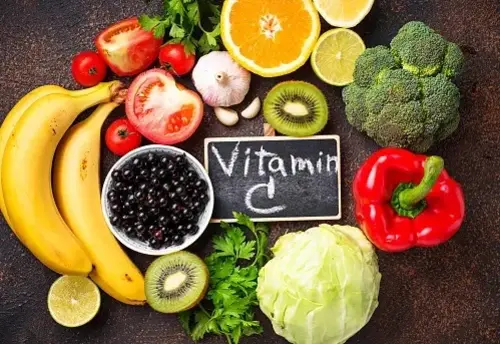Do you want to lose weight? Then, you must include Vitamin C in your diet. Shocking, huh!
Yes, my dear friend, this vitamin is not just for fighting colds; it could become your secret weapon in your weight loss journey.
Since, last few months, people asked me, “Is Vitamin C Good for Weight Loss?” and My answer is quite promising. While vitamin C alone won’t do all the work, it plays a vital part alongside other nutrients.
A Research Published in Journal of the American College of Nutrition, 2005 revealed that people with lower vitamin C levels found it more challenging to shed pounds. This indicates vitamin C’s significant role in weight loss.
As you start new workouts, think of vitamin C, It’s present in plenty of tasty, low-calorie foods (like oranges, broccoli, and strawberries), allowing you to enjoy nutrition without worrying about extra calories.
Also read: Surprising Ways Blackberries Can Benefit Your Body in Losing Weight!
Some choose vitamin C supplements to ensure they’re getting enough, which is perfectly fine. Keeping vitamin C in your daily regimen is crucial for moving toward a healthier, trimmer you.
Let’s make vitamin C a part of our weight loss plan. It’s an easy, effective strategy that supports overall well-being. Are you ready to give it a shot? Let’s take this step together!
Table of Contents
Is vitamin C good for weight loss?
How does Vitamin C contribute to weight loss? It revolves around understanding the role of the hormone cortisol and its functions.
When you experiencing stress your brain starts releasing cortisol known as a stress hormone, which is designed to shield your body from both physical and mental stress effects, leading to the accumulation of body fat, particularly around the abdomen.

In contemporary times, stress often results in a loss of appetite, yet the result remains unchanged: absence of food intake. As a consequence, cortisol converts glucose into fat rather than glycogen, which serves as energy. Are you keeping up?
Also read: Unveiling the Hidden Power: Are Dragon Fruits Good for Weight Loss?
Vitamin C, a potent antioxidant, mitigates the effects of stress. Adequate levels of Vitamin C make your brain perceive less stress, thus reducing cortisol release and preventing the formation of new abdominal fat. This illustrates one of the ways Vitamin C facilitates weight loss.
For expedited weight loss, it’s crucial to prevent new fat from being stored and to eradicate existing fat.
L-carnitine plays a role in the latter. L-carnitine is an amino acid that transports fat cells to the liver. Your body cannot directly digest stored fat and dispose of it; it must be burnt as glycogen, but this process requires the fat to be transported from your abdominal area first.
Research from Arizona State University indicated that L-carnitine could enhance fat loss by up to 30%. Nonetheless, the production of L-carnitine is dependent on an ample supply of Vitamin C.
How can one ensure they are getting enough Vitamin C?
Fresh fruits and vegetables are the most effective sources. Adopt a diet rich in Vitamin C by including foods such as spinach, kale, strawberries, pomegranates, grapefruit, and oranges. Strive to incorporate a Vitamin C-rich food into every meal.
Also read: Is Eating Watermelon at Night Good for Weight Loss?
The requirement for Vitamin C varies from person to person, negating a universal dosage recommendation. The Institute of Medicine suggests a daily intake of 90 mg for men and 75 mg for women.
Research indicates that individuals with low Vitamin C levels burn 30% less fat during moderate exercise compared to those with adequate levels. In essence, insufficient Vitamin C can impede fat loss, leading to increased body weight.
Lastly, excessive abdominal fat, a sign of metabolic syndrome, elevates the risk of heart disease and stroke.
Boosting your Vitamin C intake can indirectly reduce your waistline and offer broad health benefits. Let’s incorporate Vitamin C into our weight loss journey and improve our overall health!
How much vitamin C is enough for our body?
Adults should aim for 65 to 90 mg of vitamin C each day, but it’s important to stay under 2,000 mg.
Also read: Craving Sugar? Learn, How Does Sugar Affect Weight Loss?
Consuming a diet, rich in vitamin C from foods is generally safe. However, overdoing it, particularly with supplements, can lead to unpleasant side effects. You may experience nausea, vomiting, stomach pains, heartburn, cramps, insomnia, and headaches.
What are Some Good Dietary Sources of Vitamin C?
Citrus Fruits like 100 grams Oranges, lemons, limes, and grapefruits have 50-70mg of vitamin C.

Tropical Fruits like 100 grams of guavas, kiwis, mangoes, and papayas contain 125mg.
100 gm of Strawberries, raspberries, blueberries, and black currants contains about 50 to 100 mg of vitamin C.
100 gm of Bell Peppers (Red, yellow, and green) contains 135 mg of vitamin C.
100 gm of Dark Green Leafy Vegetables (like Kale, spinach, and Swiss chard) has 80mg.
Also read: Unmasking the Untold Benefits: Is Curd Good for Weight Loss?
100 gm of Broccoli and Brussels Sprouts have 51 mg of vitamin C.
100 gm Fresh tomatoes and tomato juice provide 20 mg of vitamin C.
Conclusion
I hope, this article gives you excellent information on, “Is Vitamin C Good for Weight Loss”? Merely ingesting vitamin C does not directly lead to weight loss.
Maintaining a balanced diet is essential. Consuming more calories than you burn will not result in weight loss.
If you are interested in losing approximately 2 pounds a week, eat fewer calories than what you burn daily.
Incorporating vitamin C-rich foods (Vegetables and fruits) in your diet is a smart choice. They satisfy your hunger without contributing to weight gain. It is an ideal snack option for you; what do you think? Comment Below
Stay realistic and prioritize your health. Looking forward to seeing you achieve a healthier weight!
Frequently Asked Questions (FAQs)
Q1: Is vitamin C good for Obesity?
Ans: Vitamin C plays a vital role in burning body fat and generating energy. That’s why people with low levels of vitamin C (those who are deficient in vitamin C) tend to burn less fat, even after doing moderate exercise.
Q2: What are vitamin C Side effects?
Ans: Excessive intake of vitamin C can lead to adverse effects such as
nausea,
vomiting,
diarrhea,
heartburn,
stomach discomfort,
fatigue,
insomnia,
headaches, and
skin flushing.
High doses, particularly over 2,000 milligrams daily, may increase the risk of kidney stones.
Always consult with a healthcare provider before taking large doses of vitamin C supplements.
Q3: How much vitamin C is safe daily?
Ans: An adult can take vitamin C from 65mg to 90mg per day. Always consult with a healthcare provider before taking large doses of vitamin C supplements.
Tag: Is it good to put vitamin C everyday?
